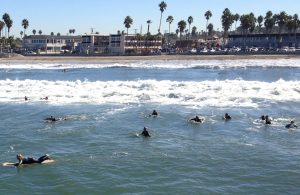Sampling completed for study probing relationship between HF183 and illness risk

SCCWRP and its partners have successfully completed field sampling for a four-year study probing the relationship between levels of the fecal contamination marker HF183 in wet-weather runoff and the risk that humans exposed to this contamination will become sick.
The study’s goal is to increase the management utility of HF183, a genetic marker that is an indicator of human fecal contamination. Although HF183 is widely used as a tool for detecting human fecal sources, no health thresholds have been developed to date that explain illness risks for beachgoers and other people who may inadvertently ingest fecal contamination that comes from wet-weather runoff.
Field sampling, which took place over two wet-weather seasons, wrapped up in March. The study is being conducted in partnership with the Southern California Stormwater Monitoring Coalition.
Researchers are working to develop an HF183 health risk model that can predict how many humans will get sick after exposure to runoff that has been contaminated with a given level of HF183.
More news related to: Microbial Risk Assessment, Microbial Water Quality